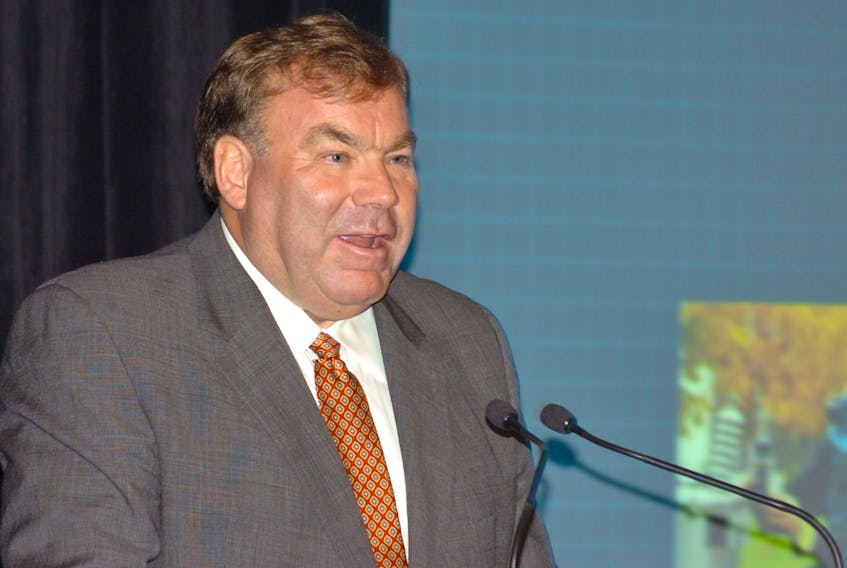ST. JOHN'S, N.L. — Stan Marshall became Nalcor Energy president and CEO at a difficult time in April 2016, on the heels of the sudden departure of the former CEO, followed by the entire board of directors.
Marshall says having representatives from the government with him in stepping into the aftermath helped. And he has suggested the province consider reinstalling government staff on the Crown corporation board and maintaining direct representation.
On April 22, 2016, the Ball government appointed Marshall to lead Nalcor Energy. There was also a new, interim, board chair — lawyer John Green. The interim board had five members: Memorial University vice-president of research Chris Loomis, Marshall, Green and two provincial government deputy ministers.
“I had recommended that they appoint two deputy ministers as directors,” Marshall testified Friday at the Muskrat Falls Inquiry.
The appointments were “interim” because the Liberal government had legislation coming to create a new appointments commission for the province, for agencies, boards and commissions. The commission would ultimately make recommendations for longer-term appointments to Nalcor Energy’s board of directors.
In the meantime, stepping into what he’s called a “chaotic” situation and period of crisis, Marshall asked the Liberals to appoint the deputy ministers of Finance and Energy (Natural Resources) to work with him. They ended up appointing deputy minister of Finance Donna Brewer and deputy minister of Justice Heather Jacobs.
“The time I had the two deputy ministers there in a crisis, it was very beneficial. They could help me get the message through to the government. I didn’t have to worry sometimes about Finance knowing about something, because the deputy minister of Finance was there,” Marshall said.
At the inquiry, he emphasized the benefit to communications between the government and Nalcor, and vice versa.
Commissioner Richard LeBlanc asked Marshall about the concern that a government representative could theoretically carry more weight than the other directors, or even be viewed from the outside as having an unfair level of influence on decisions made.
“I think that’s a general concern,” Marshall said.
But he also spoke about experiences in the private sector and the fact larger shareholders would want and expect eyes and ears at the board table.
“Yes, initially that can be a little bit intimidating, but I think the benefits far outweigh,” he said. “That way, nobody can complain that they didn’t know.”
Working with recommendations from the Independent Appointments Commission, the provincial government named a new board, effective Dec. 1, 2016. Marshall says he was interested at the time in continuing with the interim directors in place.
It wasn’t the quality of the people coming in, he said, but the fact there was a whole new board again.
“You’re bringing on a whole new board the one time. Now this is almost unheard of in the private sector,” he said. “Appointments are meant to be staggered, to maintain a level of institutional knowledge and limit the learning curve.”
Marshall said the Nalcor board coming in was, regardless, “excellent.”
“I very much appreciate what they went through and I thank them for the trust they had in me, but it was a very difficult situation,” he said.
He says that when it comes to government-Nalcor relations, you don’t need more reporting mechanisms, you need one you can trust.

As it stands, the Energy Corporation Act says the Nalcor Energy board of directors can’t have fewer than five people, meaning one or two government appointees – if that idea was followed through – would not hold a voting majority. The board cannot have more than 14 members.
Appointments to the board of directors are currently recommended through the Independent Appointments Commission, but the commission does not make the appointments. Appointments are made through cabinet.
Auditors report again
Meanwhile, also on Friday, the Muskrat Falls Inquiry heard from Jennifer Fiddian-Green, a partner with auditors Grant Thornton. She reported on a piece of work for the inquiry, specifically digging into project-related claims and complaints made in anonymous letters. It included a closer review of living allowances for workers living off-site, the accounting of supplies (including small tools and personal protective equipment), a review of the potential for non-arm’s-length contracts and checks of the records of hours worked (hours contracted and hours paid).
There were a few points made relating to internal reporting measures, but nothing that would be described as a bombshell for the inquiry. There was credit given to work by Nalcor’s internal audit. For example, on an examination of work hours, Grant Thornton auditors identified a handful of cases for further review. Following interviews, one still stood out, unexplained. It had already been flagged by internal auditors, with the employee in question reportedly fired from the project.
ashley.fitzpatrick@thetelegram.com
RELATED
- Nalcor Energy board needs compensation, chairman tells Muskrat Falls Inquiry
- The Muskrat Falls Inquiry (Phase II)
Your say
The Muskrat Falls Inquiry is headed into its third and final phase of review, scheduled to run July 16-26. A witness schedule is now available online.
The sessions are set to cover multiple topics, including: preparing for 2041; energy regulation in Newfoundland and Labrador; managing large-scale, publicly funded projects; and the role of the civil service and record keeping.
There will be invited witnesses, but also expert reports sought by inquiry counsel.
Commissioner Richard LeBlanc made a point to mention the Leslie Harris Centre for Regional Policy and Development (Memorial University Harris Centre) has been asked to host two sessions, to gather comments from members of the public on anything falling in the inquiry’s mandate.
The first public session is scheduled for July 30 from 7-9 p.m. at the Emera Innovation Centre, Signal Hill Campus in St. John’s.
The second public meeting is scheduled for Aug. 8 from 7-9 p.m. (local time) at the Lawrence O’Brien Arts Centre in Happy Valley-Goose Bay.
Sessions will continue to be webcast at muskratfallsinquiry.ca/webcast.









